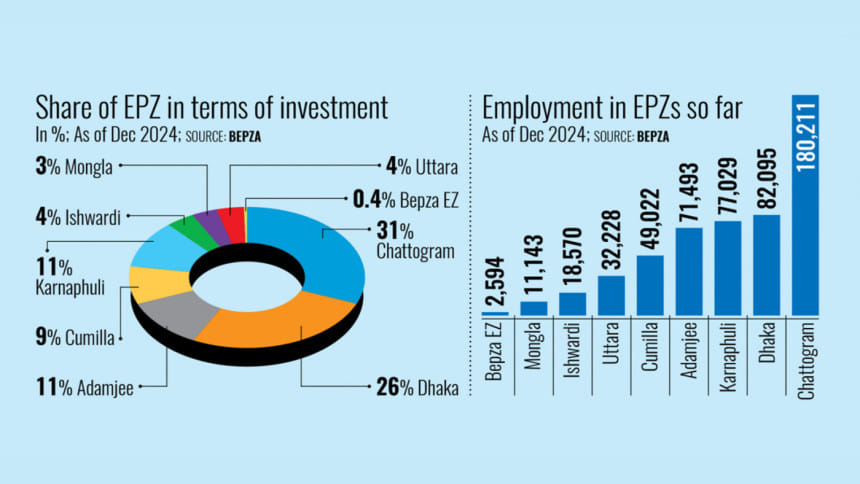China second biggest investor in Bepza zones after Bangladesh

Chinese investment in all eight export processing zones (EPZs) of the Bangladesh Export Processing Zones Authority (Bepza) and its economic zone in Chattogram is only exceeded by domestic investment, show documents of the government agency.
So far, companies from a total of 38 countries have invested in the Bepza EPZs. Bangladesh ranks first in terms of investment, with 148 of its local companies having vested interests in these industrial enclaves.
China holds the second position as 108 of its companies have invested in EPZs, while South Korea follows with 62 companies.
The number of foreign firms invested in local EPZs also includes 30 from Japan, 19 from India, 19 from the UK, 17 from the US, 10 from Canada, seven from Sri Lanka, and six from the Netherlands.
Bepza Chairman Major General Abul Kalam Mohammad Ziaur Rahman informed that US President Donald Trump has announced plans to impose a 10 percent tariff on Chinese goods from February 1.
"This will raise the price of Chinese products in the American market. Consequently, the products will lose competitiveness," he said.
So, many Chinese entrepreneurs have started relocating their industries to other countries, with Vietnam, Cambodia, Indonesia, Sri Lanka, Myanmar, and Bangladesh becoming their preferred destinations.
"Among these, Bangladesh ranks as the top choice," Rahman said.
"We are seeing significant interest from Chinese firms to invest in the country. Just three or four days ago, we received a proposal for a $150 million investment," he added.
Rahman also highlighted the demographic challenges in China.
"The number of young people in China has decreased, leading to a shortage in its workforce. As such, those available are demanding significantly higher wages."
The Bepza chief addressed concerns regarding foreign direct investment (FDI) in Bangladesh, particularly in the aftermath of last August, when the Awami League government was ousted by a mass uprising.
"Numerous investors are actively reaching out with plans for new investments, which reaffirms the country's potential for FDI," he said.
At present, there are 449 industrial establishments operating in the eight EPZs under Bepza and the BEPZA Economic Zone in Chattogram.
They have generated employment for 524,385 people, with a total investment of $6,914 million.
The combined area of the eight EPZs and BEPZA Economic Zone is only 3,445 acres. However, these industrial areas contributed 29 percent of the country's total FDI in fiscal 2023-24.
Data from the Bangladesh Bank shows that FDI inflows amounted to $1,468 million in the last fiscal year, with $424 million of the total coming as investments in the EPZs.
Ashraful Kabir, member for investment promotion at BEPZA, noted that by reducing reliance on garment making, the EPZs are strengthening the country's economic foundation through product diversification and export expansion.
"Beyond garments and garment accessories, 48 percent of the products manufactured in the EPZs are now diversified items," he said.
Bepza began developing its ninth industrial area, the Bepza Economic Zone, in 2018 on 1,138 acres of land in Mirsarai, Chattogram.
The project, which is still underway, aims to construct 539 industrial plots and 45 factory buildings.
So far, 42 domestic and foreign investors have signed agreements with Bepza to collectively invest $970.91 million in this zone. Of the planned industrial plots, 249 have already been allocated.
Bepza has also initiated land development for two EPZs in the Jashore and Patuakhali districts.
The Patuakhali EPZ, spanning 410.78 acres, will feature 306 industrial plots. It is expected to attract investment of $1,530 million, generate $1,836 million in annual exports, and create 100,000 opportunities for direct employment and 200,000 opportunities for indirect employment.
The Jashore EPZ, covering 503 acres, will comprise 400 industrial plots. Bepza anticipates that this zone will draw investments of $2,000 million, generate $2,400 million in annual exports, and create 150,000 direct jobs and 300,000 indirect jobs.

 For all latest news, follow The Daily Star's Google News channel.
For all latest news, follow The Daily Star's Google News channel. 



Comments